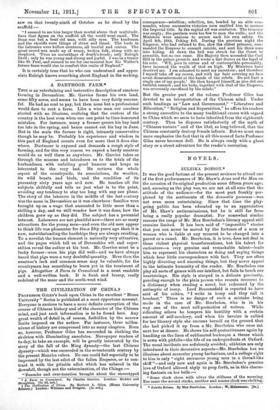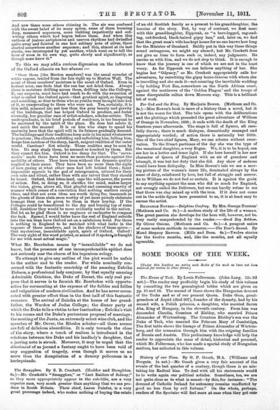NOVELS.
Z1TLEIKA DOBSON.* IT was the good fortune of the present reviewer to attend one of the first performances of Mr. Shaw's Arms and the Man on the occasion of its original production some fifteen years ago ; and, amusing as the play was, we are not at all sure that the attitude of the audience—for the most part frankly per- plexed by the sentiments of the dramatis personae—was not even more entertaining. Since that time the play- going public has been educated up to an appreciation of Mr. Shaw's antinomianisms, but he is still far from being a really popular dramatist. For somewhat similar reasons the range of Mr. Max Beerbohm's literary appeal still remains limited. It has been said of " impossible " stories that you can never be moved by the fortunes of a man or woman who is liable at any moment to be changed into a parrot or a camel. Mr. Beerbohm, it is true, does not deal in these violent physical transformations, but his talent for caricature—a very genuine and remarkable talent—leads him to represent his characters as doing and saying things which bear little correspondence with fact. They are often highly diverting and amusing things, but they never appeal to the intimate humanity of the reader. Mr. Beerbohm can play all sorts of games with our intellect, but fails to touch our heartstrings. His style is steeped in a delicate preciosity, puzzling enough to the plain person who resents recourse to a dictionary when reading a novel, but redeemed by the antiseptic of irony. Lord Beaconsfield is reported to have said of his critics, " I write in irony and they call it bombast." There is no danger of such a mistake being made in the case of Mr. Beerbohm, who is in his way one of the most self-protective of writers. While ridiculing others be tempers his hostility with a certain amount of self-mockery, and when his heroine is rallied for her literary style she excuses herself on the ground that she bad picked it up from a Mr. Beerbohm who once sat next her at dinner. He shows his self-protectiveness again by handling on the lines of sublimated burlesque a theme which is sown with pitfalls—the life of an undergraduate at Oxford. The usual incidents are sedulously avoided; athletics are only introduced in their decorative aspects—Mr. Beerbohm has no illusions about muscular young barbarians, and a college eight to him is only "eight enormous young men in a thread-like skiff "—and only now and again is Mr. Beerbohm's genuine love of Oxford allowed shyly to peep forth, as in this charm- ing fantasia on her bells:— "Some clock clove with silver the stillness of the morning. Ere came the second stroke, another and nearer clock was striking.
• Zalsika Dobson. By Max Beerbohm. London : W. Heinemann. DOA
And now there were others chiming in. The air was confused with the sweet babel of its many spires, some of them booming deep, measured sequences, some tinkling impatiently and out- wtting others which had begun before them. And when this anthem of jealous antiphonies and uneven rhythms had dwindled quite away and fainted in one last solitary note of silver, there started somewhere another sequence ; and this, almost at its last stroke, was interrupted by yet another, which went on to tell the hour of noon in its own way, quite slowly and significantly, as though none knew it
To this we may add a curious digression on the influence of the Oxford climate on her alumni :—
" Over them [the Merton meadows] was the usual coverlet of white vapour, trailed from the Isis right up to Merton Wall. The scent of these meadows' moisture is the scent of Oxford. Even in hottest noon, one feels that the sun has not dried them. Always there is moisture drifting across them, drifting into the Colleges. It, one suspects, must have had much to do with the evocation of what is called the Oxford spirit—that gentlest spirit, so lingering and searching, so dear to them who as youths were brought into ken of it, so exasperating to them who were not. Yes, certainly, it is this mild, miasmal air, not less than the grey beauty and gravity of the buildings, that has helped Oxford to produce, and foster eternally, her peculiar race of artist-scholars, scholar-artists. The undergraduate, in his brief periods of residence, is too buoyant to be mastered by the spirit of the place. He does but salute it, and catch the manner. It is on him who stays to spend his maturity here that the spirit will in its fulness gradually descend. The buildings and their traditions keep astir in his mind whatsoever is gracious ; the climate, enfolding and enfeebling him, lulling him, keeps him careless of the sharp, harsh, exigent realities of the outer world. Careless? Not utterly. These realities may be seen by him. He may study them, be amused or touched by them. But they cannot fire him. Oxford is too damp for that. The `move- ments' made there have been no more than protests against the mobility of others. They have been without the dynamic quality implied in their name. They have been no more than the sighs of men gazing at what other men had left behind them ; faint impossible appeals to the god of retrogression, uttered for their own sake and ritual, rather than with any intent that they should be heard. Oxford, that lotus-land, saps the will-power, the power of action. But, in doing so, it clarifies the mind, makes larger the vision, gives, above all, that playful and caressing suavity of manner which comes of a conviction that nothing matters except ideas, and that not even ideas are worth dying for, inasmuch as the ghosts of them slain seem worthy of yet more piously elaborate homage than can be given to them in their heyday. If the Colleges could be transferred to the dry and bracing top of some bill, doubtless they would be more evidently useful to the nation. But let us be glad there is no engineer or enchanter to compass
the task. Ego I would liefer have the rest of England subside into the sea than have Oxford set on a salubrious leveL For there is nothing in England to be matched with what lurks in the vapours of these meadows, and in the shadows of these spires-- that mysterious, inenubilable spirit, spirit of Oxford. Oxford ! The very sight of the word printed, or sound of it spoken, is fraught for me with most actual magic."
What Mr. Beerbohm means by " inenubilable" we do not know, but the presence of one incomprehensible epithet does not seriously mar the charm of his ingenious eulogy.
To attempt to give any outline of the plot would be unfair to the author and to the reader. For while nominally con- cerned with the fantastic courtship of the amazing Zuleika Dobson, a professional lady conjurer, by that equally amazing Admirable Crichton, the Duke of Dorset, the only real pur- pose that it serves is to furnish Mr. Beerbohm with opportu- nities for coruscating at the expense of the foibles and follies and vulgarities of modern civilization. And he has never corus- cated with greater effect than in the first half of this fantastic romance. The arrival of Zuleika at the house of her grand- father, the Warden of Judas College ; the dinner party at which the Duke falls a victim to her fascination ; Zuleika's visit to his rooms and the Duke's portentous proposal of marriage ; the meeting of the Junta, an extremely select wine club, and the speeches of Mr. Oover, the Rhodes scholar—all these scenes are full of delicious absurdities. It is only towards the close of the story, where a touch of realism is introduced in the relations between the Duke and his landlady's daughter, that a jarring note is struck. Moreover, it may be urged that the denoiimenf of so jocund a fantasy ought to have been void of any suggestion of tragedy, even though it moves us no more than the decapitation of a dummy policeman in a harlequinade.



















































 Previous page
Previous page